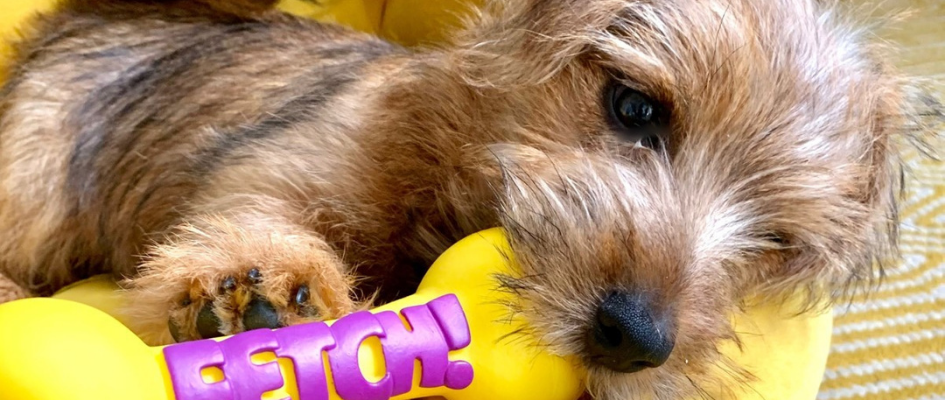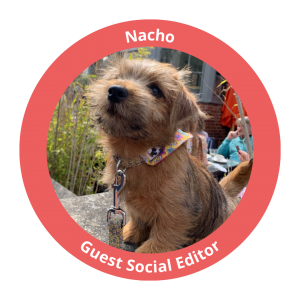Pet Corner: Written by Goddard Veterinary Group’s Guest Social Editor, Nacho from The Four Legged Foodies
Once you’ve decided to get your puppy, it’s easy to get caught up in the excitement and forget what a big impact your new arrival is about to have on your life. I moved in with my new family in April and although they already had Archie, it’s been almost 11 years since he was a puppy and my humans realised, they’d forgotten how challenging those first few weeks/months can be!
Here are my human’s top tips for welcoming a new puppy into your home:
Before Puppy Arrives
As well as the obvious long list of things you will need to purchase like a bed, toys, treats etc, there are also a few other key things to get in place before you bring your puppy home.
Register with a vet
Find your nearest Goddard Veterinary Group practice, let them know you have a pup on the way, and arrange an initial visit within his first few day’s home. The sooner your pup gets used to the vets the better and if his first visit is just meeting some friendly people and getting treats, he will always be happy to return.
Set up insurance
The minute the breeder hands over the pup to you, he is your responsibility so insurance needs to be set up in advance with that date as the policy start date. And it’s not just health issues you need to consider. Dogs are also very accident-prone and if yours has an accident like being hit by a car, you may not just have a vet’s bill but also a claim for damage/injury to the car owner. All pet insurance policies include third-party liability cover up to £2,000,000. Do your research to find the best policy for you.
Decide on house rules
Will pup be crate trained? Will you use that crate at other times or just overnight? Which room will the crate be in? Will pup be allowed upstairs/on the sofa/on your bed? What times will you feed him?
These are just a few things to consider but whatever you decide for your own home, the key thing is to have everyone in your home on the same page. There is nothing more confusing for a pup to be encouraged on the sofa by one human, only to be told off by another.
Puppy proof your home
Your pup will be immediately inquisitive about his new surroundings when he arrives home and there are certain items you will need to protect from potential destruction and others you will need to remove for your pup’s safety. If this is your first dog, check out this list of hazardous items some of which can be fatal to dogs. This includes plants, food and chemicals.
Puppies also love to chew, especially until they get their adult teeth (around 30 weeks old) so you will need to remove anything precious or potentially dangerous such as electric cables. Make sure your pup has plenty of interesting chew toys to keep him occupied and keep his eyes off your designer shoes!
Book puppy classes
We highly recommend you take your pup along to classes even if you’ve had dogs for years and are confident in your training abilities. Puppy Classes will help you with basic training but they are also a great place for your pup to socialise with other dogs, humans and children. Good puppy classes with reputable trainers get booked up quickly so you will need to get your pup signed up in advance. Puppy classes are generally for pups up to 20 weeks old.

Puppy’s First Few Weeks
Getting Out and About
Getting your pup out into the world from day one, helps them to get used to the sights and sounds of your area and helps prevent them being fearful later on. We suggest you get your pup out on walkies even before they are allowed to walk on the ground by using a carry bag or sling or maybe a stroller for larger dogs.
Once fully vaccinated, it’s great to get your puppy used to the place where you are likely to walk most but in the early days of training that place needs to be carefully chosen. For example, our closest park is Richmond Park but the vast open space and extra dangers of wild deer and a busy road running through it are probably not the best place to practice recall. We have therefore chosen a small, enclosed recreation ground nearby for Nacho’s walks and any off-lead activities.
Establishing a Routine
You will need to let your pup know what their daily life is going to be like and the sooner you introduce them to these things, the better. If your pup is going to be left alone while you go out to work or play without them, then introduce this slowly over their first months if possible. Adult dogs should not be left home alone for more than 4 hours at a time and for pups it’s even less.
Other things that will become part of their routine you may need to consider include:
- Introducing them early to their professional walker/carer, groomers and vets.
- Getting them used to various modes of transport.
- Taking them to dog-friendly places.
- Allowing them to socialise with people and other dogs.
- Introduce them early to anyone who will be a regular visitor to your home.
Being Social
No, we don’t mean setting up an Instagram account! Get your pup to meet as many doggies of all ages and sizes as you feel comfortable with. If you are a bit nervous about this, get some of your doggie friends to help you and always check with other owners that their dog is OK with puppies. Playing with other dogs is an important part of your dog’s development and older dogs can help your puppy learn what is acceptable.
Your puppy should also get used to humans of all shapes and sizes, especially any that will be part of their lives. Some common issues that dogs can develop are people wearing hats/helmets or high visibility clothes, children on bikes/scooters and, of course, the postman! The earlier you can get your pup to learn there is nothing to fear from any of these, the better. If you usually walk in a park, try mixing in some street walks so your pup can encounter a variety of sights, people and sounds such as these and also things like sirens and other loud city noises.
Provide Mental Stimulation
Puppies are inquisitive and constantly looking for mischief, on top of which they are desperate to chew, especially until they lose their puppy teeth. Giving them a variety of toys and games to keep them occupied will not only save your furniture and shoes from certain destruction but will also get them using their brains.
Providing puppies with ‘doggy jobs’ which involve a repetitive action such as licking, sniffing or chewing encourages your puppy to be calm, keeps them mentally stimulated and helps them settle. There are many excellent brain toys for your pup including K9 Connectables, Kong® and Lickimat®
Give Them Time Out
All that learning, playing and discovering his new world is hard work so you will need to factor in some rest time for your pup. Give him a safe place to rest, somewhere away from your other dog, your children and general activity in your house. Your pup will always be more interested in what’s going on around him and want to be involved so you will need to help him when it’s time to rest.
Creating a quiet VIP den area (very important pup) will help give them a quiet safe space they can go to to get away from it all – you can use crates, pens, underneath tables and corners to create a VIP area – just as long as it’s tucked away and quiet.
That’s all, for now, folks, thanks for reading! Keep an eye on Goddard Veterinary Group’s Pet Corner for more from me and my humans, in the meantime, why not visit us on Instagram?
@the4leggedfoodies
@goddardvets
Nacho x
Please note that any advice given is the view of the blog author and is not necessarily the view or advice of Goddard Veterinary Group. Always seek advice directly from your own vet.
